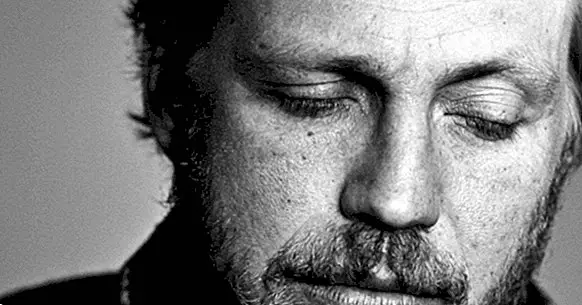Psychological help: how to know if I need it and how to find it
"I need help". Some words that we do not often hear today, although there are many people who are suffering constantly and would require the assistance of someone. Problems of self-esteem, anxiety, constant sadness, the experience of traumatic events that we can not overcome ... We are talking about people who need psychological help , but they often do not go to it for different reasons or they are not sure if their problem requires professional help or not.
In this article we are going to talk about when we need this type of help and how and where to obtain it.
- Maybe you're interested: "Types of psychological therapies"
Psychological help: how do I know if I need it?
The question of when we need the help of a professional psychologist may seem simple to answer, but the truth is that many people find it difficult to decide to consult and even consider that their discomfort is not enough to seek professional help.
The truth is in clinical practice psychologists serve all types of people, with different types of problems . People of any age and condition can go to a psychologist, although within psychology there are different profiles of more specialized professionals in certain sectors, such as child and youth psychology or psychogeriatric psychology.
There are many problems that are treated or in which a psychologist can intervene. It is common for people with mood disorders, anxiety, emotional and / or self-esteem problems, people with cognitive disorders, obsessive problems (such as OCD) or psychotic problems (for example schizophrenia), post-traumatic stress disorder to come to a professional. or those people with adaptive problems or with difficulties to face certain situations.
Sexual dysfunctions and problems of a couple, lack of communication or the presence of family problems are aspects that can also lead a person to consultation. Also other possible affectations can be learning problems, in the achievement of one's identity, or a high level of work stress. Family counseling or psychoeducation or coping with a disease can also be carried out by a psychologist.
But the above are only examples. Actually, anyone who presents some problem that generates deep psychological suffering (We are talking about an identified disorder or not) or difficulties to adapt to the environment that surrounds you can go to seek professional help. It is possible that in some cases we are facing an adaptive process or derived from a situation that we do not know how to solve or for which we do not feel that we have resources to solve.
A psychologist will not fix, for example, an economic problem or a dismissal, but it can help to recover the sense of control and combat beliefs of uselessness or maladaptive elements that are installed in the psyche of the person and that derive from it.
Of course, we must bear in mind that a psychologist is not a magician. Many people come to the clinic expecting a quick and miraculous remedy . And in most cases, this is not going to be the case. Moreover, any treatment or intervention carried out will require an effort on the part of the patient / client / user, with the psychologist serving as a guide or promoter that will lead them to overcome their problems.
- Related article: "Why psychologists do not give advice"
Why so much doubt?
Much of the blame for this fact is due to the persistence of great prejudices regarding the work of psychologists or the fact of going to one. And is that traditionally and even today has seen the fact to go to the psychologist as an indication of a serious mental health problem (until recently we were called "loqueros"), something that in turn is seen as stigmatizing .
Many people feel shame, while others may be afraid to discover the presence of serious problems. Others feel a deep reparation to open up and explain their problems to a person they do not know, even if that person is a qualified professional. Also, many believe that their condition is not serious enough or deep enough to require professional help even if they have been suffering for years.
And this can be almost dramatic, since in many cases the postponement of the search for professional help can contribute to lengthen and even chronify problems that could be solved or reduce the level of affectation that they generate in a much faster and efficient way of having initiated an earlier intervention.
Fortunately with the passage of time the level of stigmatization that has the fact of going to a psychologist has been greatly reduced, and even in regard to suffering some kind of psychological problem (being for example the problems of anxiety or depression very frequent in the majority of the population). Each time you are more aware of the need for professional help from someone trained in the functioning of the human psyche. In fact, technically it is calculated that one in four people would need some kind of psychological help at some point in his life.
- Maybe you're interested: "10 tips to choose a good psychologist"
Psychological help: public or private?
Before going on to talk about how to seek and find psychological help from a professional in this branch of science, it is worth noting that we can find professionals who practice in public health and others who work in the private sector (there are also those who practice in both ).
Both options have advantages and disadvantages. On the one hand, private practice supposes a disbursement that depending on the professional, their experience, theoretical framework or specialization in a specific topic may be greater or lesser. Also, the large number of private professionals makes it difficult to choose one in particular. On the other hand it is possible to track each case more deeply, frequently and effectively, the sessions are longer and generally productive and there are no waiting lists.
With regard to public health, although we are facing a mental health service that does not require direct disbursement by the patient, the limitations of the health system and the limited presence of psychologists within this system means that there is usually a certain delay when it comes to obtaining a visit, which is often monthly, and that the time each visit lasts is limited, except that there is less time to treat the problem in question).
Both in one system and in another system there are high quality professionals and that they have received an intense and exhaustive formation during years, not being its situation in the public or deprived something determining in this sense. In both cases they have the same functions and responsibilities at the legal level, and in all cases they must be registered in the official psychologists' school (otherwise they could not practice from the clinical scope) and be Psychologists Specialists in Clinical Psychology and / or have a Master's Degree in General Health Psychology.
Another type of help is different from other sectors, such as coaching. Although they can contribute to address and deal with some day-to-day problems and enhance the realization of changes and the strengthening of potential, we must take into account that most of the coaches are not psychologists and their knowledge and skills can be very limited, not being enabled for the treatment of mental or health problems and disorders.
How do you get to a psychologist?
The process of seeking and finding psychological help from a professional is relatively simple, although it depends to a great extent if professional help is sought to be taken by the public administration or by a private professional.
Private practice
In the case of seeking psychological help through private channels, the main difficulty will be to choose a professional from among the large number of existing psychology consultations and institutes. In this sense, to guide us We can make use of different directories of professionals , being the Official College of Psychologists one of those that will allow us to find the professional collegiate.
To choose correctly, it would be useful to know the theoretical framework or line used preferably by the professional (although today a large majority is eclectic with regard to the use of different techniques) in order to choose the one that we consider most appropriate, as well as the type of problem or problems that it deals with in its clinical practice. It can also be useful to know the prestige of the professional himself (although this is not indicative of us being useful).
Finally we can also guide ourselves by the opinions of the users regarding the different professionals, although we must take into account that each patient may have certain preferences and that there are different branches and ways of acting within psychology. What is good for a patient does not have to be what is good for another patient even if they have the same type of problem, and the feeling and therapeutic relationship that is established between patient and professional can vary enormously.
Another aspect to keep in mind is that if the therapeutic relationship does not flow or after a prudential time the applied treatment does not bear any fruit (remember that psychological therapy requires some time and the realization by the user of the tasks to be effective, and not always capture their benefits at the beginning), we can change professional.
Once the professional has been chosen, it will be a matter of arranging a visit with the psychologist in question via telephone or email.At that time they will request (if we do not provide them directly) a series of data in order to have a little information, such as a brief explanation of the general situation, contact data and possibly some demographic. In any case, the first visits they are centered in knowing the problem and the situation of the patient, client or user and to the evaluation of this, to later enter to analyze objectives and a possible treatment plan.
Practice in the public sphere
Arriving to arrange an appointment with a psychologist on the public road requires first of all to go to the family doctor, who Depending on the situation, the subject can be referred to psychiatry , and from this to a psychologist. However, unless a persistent and serious problem is detected, in many cases said derivation is not carried out unless the patient in question so requires (in part due to the oversaturation of the service), this being something to be taken into account.
Thus, in the first place, the patient usually passes first through the CAP (Primary Care Center), from which it can be referred to different services depending on the detected problem. In case of mental disorders, the subject is referred to a Mental Health Center (CSMA in case of adults or CSMIJ in child and adolescent population). A large part of cases only receive treatment in these devices, although in emergencies or acute phases of some disorders the stay in other devices may be required.
In case of being in an urgent case, such as a psychotic outbreak or a manic state in acute phase, it can be referred to Psychiatric Emergencies (where we can find detoxification units or UHD, dual pathology, food problems , addiction to gambling, intellectual disability and mental disorder or UHEDI). In case of being in a case of addiction to a substance, the referral would be made to a Center for Care and Follow-up of Drug Addiction or CAS.
The subject will be in an acute unit during the first three or four weeks in order to stabilize it. After the stabilization of the patient or in case of needing a temporary internment until it is completely stable, the subject may be sent to a Subacute Unit for a period of around three months. If required, the subject can be transferred to a Half-Stay Unit for about half a year, to a MILLE Unit in the case of a long stay.
In addition to that, can go to different temporary residential devices such as day hospitals , therapeutic communities or community rehabilitation services. There are also permanent ones, such as supervised flats and residential flats. In conclusion, there are many services to which a person can go if they need it, and there are alternatives to address different needs.



















